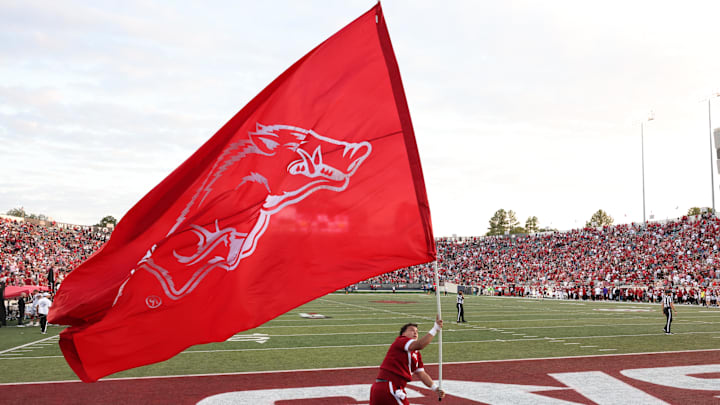Few rivalries in college football carry the unique blend of history, bitterness, and regional pride quite like Arkansas vs. Texas. It may not rank at the top of the SEC’s marquee matchups today, but for generations of fans, especially in Arkansas, this game definitely has meaning. As the Razorbacks and Longhorns square off again this weekend, it’s worth revisiting a border clash built on more than a century of shared history.
Origins and Early Dominance
The rivalry began in 1894, and from the very start, Texas seized control. The Longhorns hammered Arkansas in the opening meeting and maintained that superiority for decades. Long winning streaks, conference titles, and national power status kept Texas firmly in command. The overall series reflects that early imbalance: Texas holds a decisive 57 wins to 23 lead over the Razorbacks.
Yet even in those early years, Arkansas fans circled one game on the calendar every season, Texas week. The Longhorns became the program the Razorbacks measured themselves against, the standard they desperately wanted to surpass. Plus, with Texas’ storied program history, the matchup was always one worth circling on the calendar each year they faced off.
High Points and Defining Moments
Despite Texas’ dominance, some of Arkansas’ most iconic wins came at the Longhorns’ expense.
The most famous meeting arrived in 1969, the “Game of the Century.” Texas entered ranked No. 1, Arkansas No. 2, and the entire nation watched. President Richard Nixon flew Air Force One into Arkansas to watch the game and promised to give a national championship plaque to the winning team. The Longhorns escaped Fayetteville with a narrow 15–14 victory, but the magnitude of that showdown only deepened the rivalry.
There were Arkansas triumphs as well. In 1964, the Razorbacks toppled top-ranked Texas on their way to a national championship. The Hogs won 14-13 when Texas failed an attempt at a late two-point conversion. In 1981, Arkansas stunned the college football world by blowing out No. 1 Texas in Fayetteville, a runaway win that instantly became part of Razorback lore.
The teams also met in major bowl games. Arkansas’ dominant performances in the 2000 Cotton Bowl and the 2014 Texas Bowl reignited old animosity and reminded both fanbases what this rivalry feels like when stakes are high.
A Rivalry Lost, Then Found Again
For most of the 20th century, the Arkansas–Texas matchup was a Southwest Conference staple. When Arkansas departed for the SEC in 1992, the annual meeting disappeared, and the rivalry cooled. They met only occasionally, leaving a generation of players and fans to rely on stories from the past.
That changed when Texas joined the SEC. With the Longhorns officially back in the same conference as Arkansas, the door reopened for regular showdowns and the geography, history, and emotion make it a natural fit to reignite.
Recent Momentum and Modern Meaning
Although Texas still controls the all-time series, recent decades have been kinder to Arkansas. The Razorbacks have earned several memorable wins in the 2000s, including the emphatic 40–21 victory in Fayetteville in 2021. That game showcased just how alive this rivalry still is, even after years of separation. Arkansas actually owns the series 4 to 3 since 2000.
For Arkansas fans, beating Texas is always special. For Texas, it’s a chance to reaffirm supremacy over a longtime foe. For both programs, it represents a link between the past and the present, a reminder of where they’ve been and what they still hope to become.
Why This Weekend Matters
This weekend’s matchup isn’t just another game on the schedule. It’s another chapter in a long-running story filled with pride, grudges, and regional bragging rights. The SEC has its share of legendary rivalries, but Arkansas vs. Texas still carries real weight. Even if many outside the region don’t know the full history, the fans of both teams certainly do.
No matter where each team sits in the standings, this one always carries some flare to it. And as they take the field again, both programs know one truth: history matters, and so does beating your old rival.
